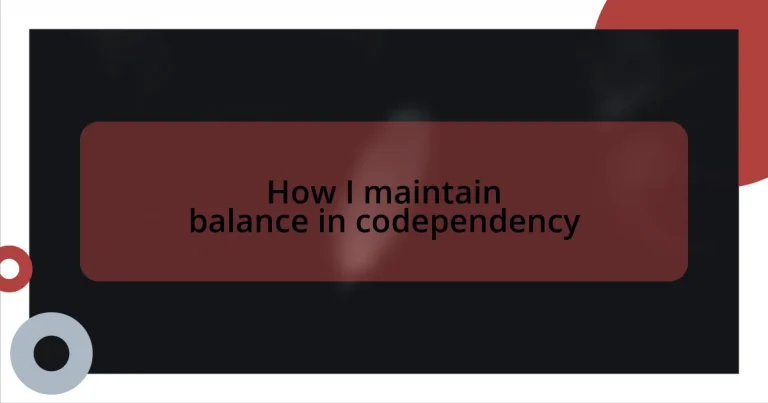Key takeaways:
- Recognizing and prioritizing one’s own needs is essential in overcoming codependency.
- Setting healthy boundaries protects emotional wellbeing and fosters deeper connections in relationships.
- Effective communication, including active listening and honest expression of feelings, enhances relationship dynamics.
- Cultivating self-care practices, like journaling and intentional planning, significantly promotes personal growth and balance.
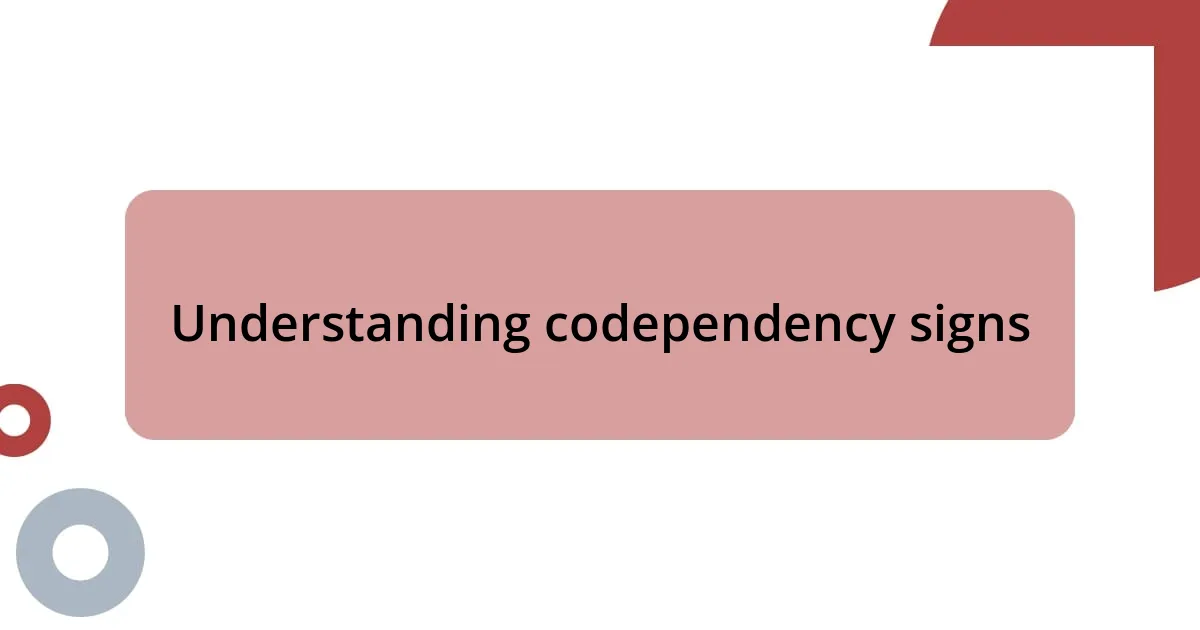
Understanding codependency signs
Recognizing the signs of codependency is crucial for personal growth. Ever found yourself prioritizing someone else’s needs over your own consistently? I remember a time when I couldn’t decide whether to go out with friends or stay home to cater to a partner’s mood. That constant tug-of-war left me drained but also made me think: why was I placing their happiness above my own?
Another sign is feeling responsible for another person’s feelings or actions. I once felt like I was walking on eggshells around a friend who struggled with addiction. It was as if their emotional state was a mirror reflecting my worth. How many times have you felt this weight, believing their happiness was tied directly to your actions? It’s an exhausting mindset that leaves little room for your own emotional wellbeing.
Additionally, taking on the role of the caretaker can indicate codependency. I used to believe that my value was tied to helping others, often neglecting my own needs. Did you catch yourself feeling unfulfilled unless you were solving someone else’s problems? It’s a slippery slope that can blur the lines between love and obligation, making it essential to acknowledge this pattern in our relationships.
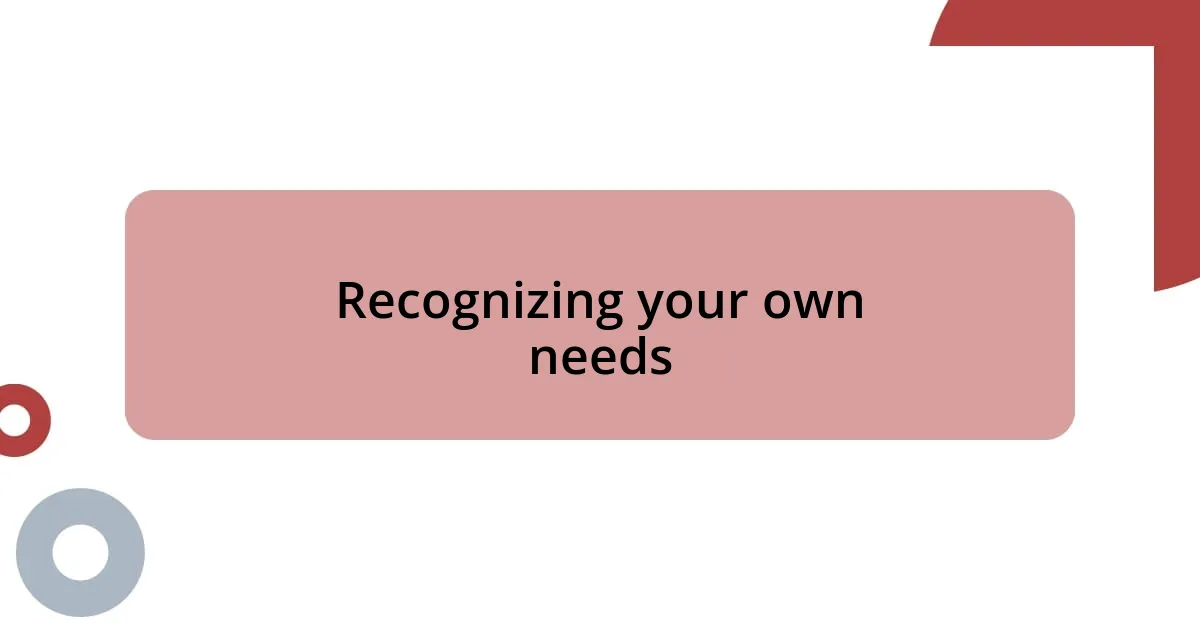
Recognizing your own needs
Recognizing your own needs is a vital step in breaking free from codependency. There have been times in my life where I overlooked my own desires, thinking they weren’t as important. I remember one instance when I was so focused on my partner’s career goals that I forgot to mention my own aspirations. Taking a moment to reflect on what I truly wanted helped me realize that my dreams mattered just as much.
To better recognize your needs, consider the following:
- Daily check-ins: Ask yourself how you feel at different points during the day.
- Journaling: Write down your thoughts and feelings to identify patterns that indicate your needs.
- Setting boundaries: Start small by vocalizing what you need or want in a conversation.
- Prioritizing self-care: Engage in activities that nurture your physical, emotional, and mental health.
When I began to embrace these practices, my emotional landscape shifted tremendously. It became increasingly clear that honoring my needs wasn’t selfish; it was essential for a healthier, more balanced relationship.
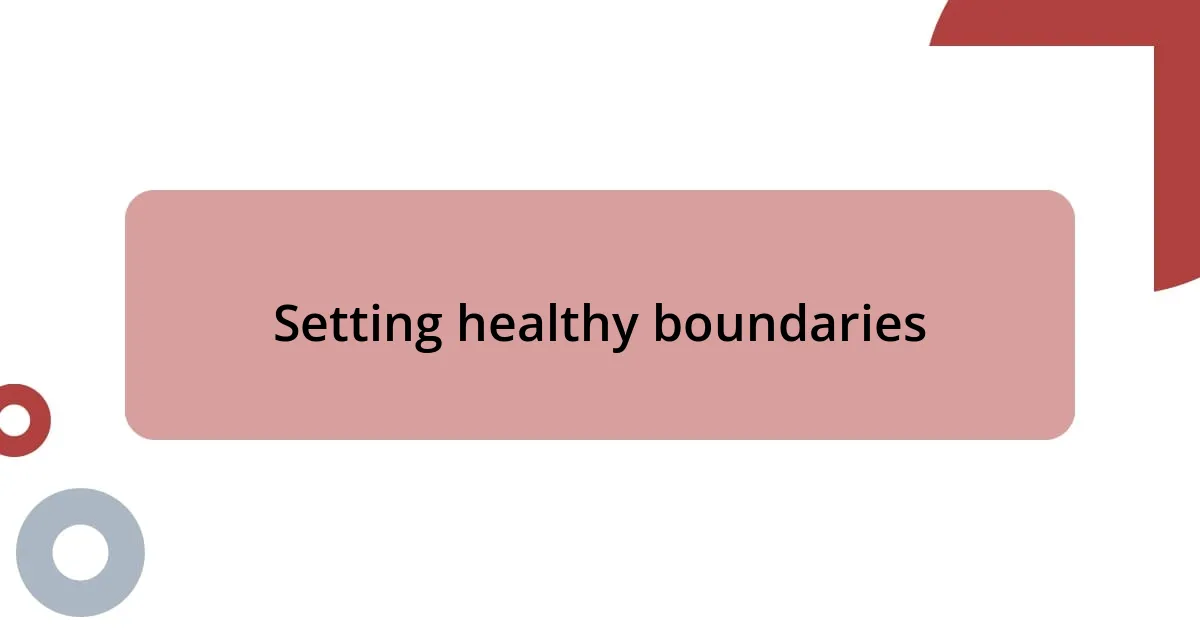
Setting healthy boundaries
Setting healthy boundaries is fundamental when navigating codependent relationships. I’ve had moments where I felt my boundaries were constantly being tested, especially when trying to please others. One pivotal experience was saying no to a friend who frequently asked me to cover their shifts at work. The first time I declined, my heart raced; I worried about letting them down. However, establishing that boundary taught me the importance of prioritizing my time and mental health, ultimately strengthening our friendship.
It’s important to remember that healthy boundaries aren’t walls that isolate us from others; rather, they serve as guidelines that protect our emotional space. I can think back to when I initiated a boundary around discussing certain sensitive topics with a family member. They initially reacted defensively, but I held firm. Over time, this boundary opened the door to more respectful conversations, demonstrating that healthy limits can foster deeper connections while still keeping our needs in mind.
Finding the balance can be tricky, but trust me, clear communication is key. I recall an earlier struggle when I hesitated to express my discomfort about late-night calls from a relative. It felt awkward setting limits, but once I finally spoke up, I realized how much relief it brought. It’s a process that may take practice, but I believe it’s worth the effort for a healthier relationship dynamic.
| Action | Effect |
|---|---|
| Say ‘no’ when needed | Protects your time and energy |
| Communicate boundaries clearly | Fosters respect and understanding |
| Engage in self-reflection | Enhances personal growth |
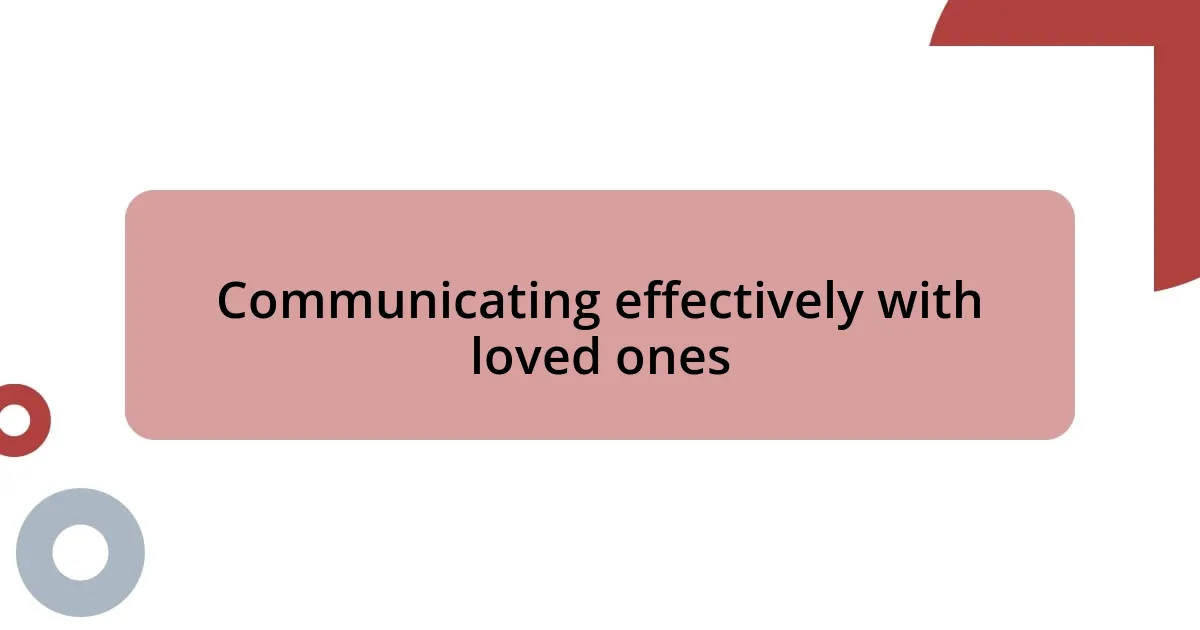
Communicating effectively with loved ones
Effective communication with loved ones can transform the dynamics of a codependent relationship. I’ve learned that actively listening is just as crucial as expressing my feelings. There was a memorable moment when a disagreement escalated because I wasn’t fully attentive to my partner’s concerns. Once I shifted my focus and really listened, we not only resolved the conflict but also deepened our understanding of each other.
I often find that sharing my emotions honestly fosters a more authentic connection. For instance, when I felt overwhelmed by the responsibilities we were sharing, I hesitated to bring it up. But when I finally mustered the courage to express my feelings, I was surprised by how gently my partner responded. It was a reminder that vulnerability can lead to greater intimacy, allowing both parties to feel seen and heard.
At times, I wonder if we take for granted the power of simple, honest dialogue. I remember a phase when I relied heavily on indirect hints to communicate my needs, which only led to confusion and frustration. Once I began speaking my mind directly, I noticed a significant shift. The relief of clear communication not only alleviated misunderstandings but also encouraged those around me to do the same. Sharing my thoughts became easier, and our connections grew stronger as a result. Don’t you think that open dialogue could foster such a supportive environment in your own relationships?
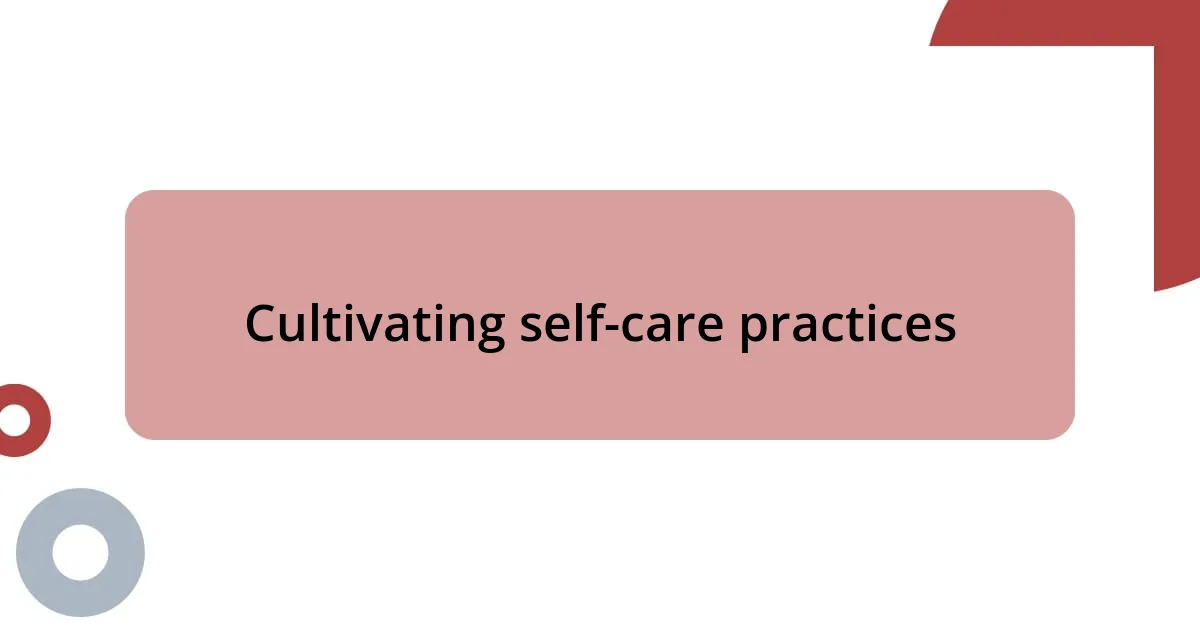
Cultivating self-care practices
Cultivating self-care practices has been a game changer for me in managing codependency. I remember the time I set a weekly “me day” where I could focus solely on activities that rejuvenated me, like reading or taking long walks. It was a bit uncomfortable at first, almost like I was stealing time from obligations, but eventually, it became a sanctuary I looked forward to. That space allowed me to reconnect with myself and recharge my emotional batteries.
Practicing self-care isn’t just about pampering; it’s about acknowledging and prioritizing my own needs. One experience that stands out was when I started journaling regularly. Initially, it felt like an extra task, but over time, I found it to be a therapeutic outlet for my thoughts and emotions. Writing down my feelings helped me process complex emotions and gave me clarity, which in turn made it easier to articulate my needs to others. Have you ever tried journaling? It might surprise you how much it can reveal about your inner self.
Creating a routine that includes self-care doesn’t always come naturally, especially when I’m conditioned to put others first. I found that incorporating mindfulness exercises, like meditation or deep-breathing sessions, was beneficial in grounding me throughout my day. There was a time when I faced overwhelming anxiety during stressful situations, and taking just five minutes to breathe deeply shifted my mindset. It’s incredible how small practices can have a profound impact; they not only promote my well-being but also enable me to engage more positively with those I care about. How do you think integrating self-care might change your outlook on relationships?
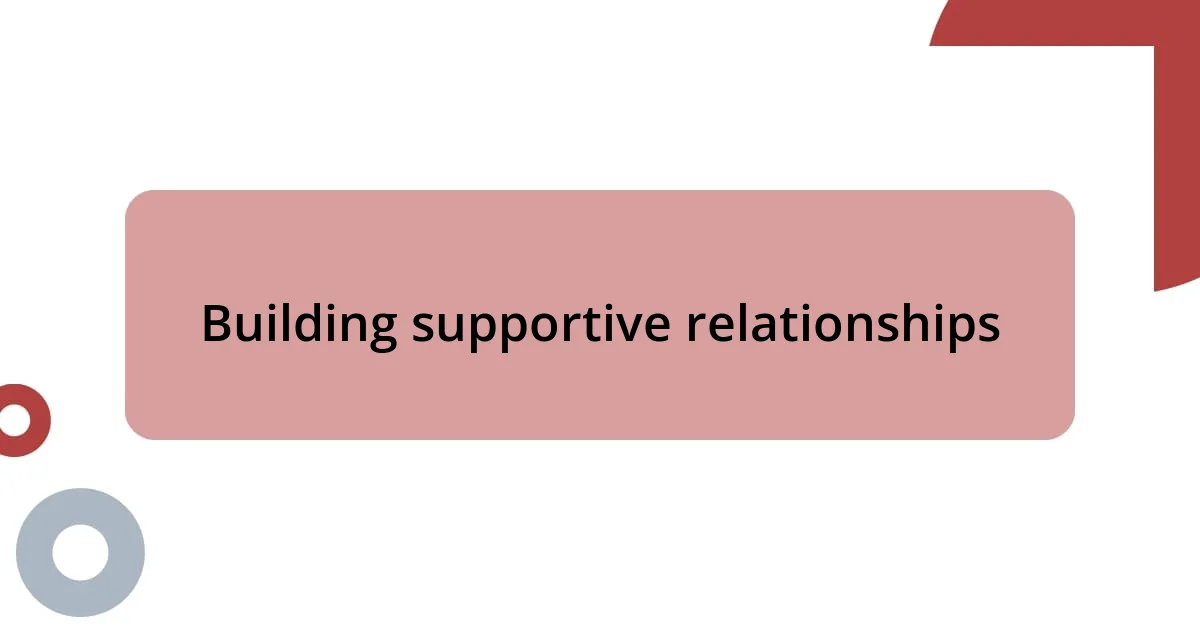
Building supportive relationships
Building supportive relationships requires a conscious effort to establish boundaries and mutual respect. I recall a time when I realized how important it was to define my limits. I was always eager to help my friends, but I found myself stretched thin. When I started sharing these boundaries, I noticed a shift. My friends respected my time and energy more, which ultimately enriched our interactions. Isn’t it interesting how clarity can foster deeper ties?
Another facet of building supportive relationships is encouraging each other’s growth. There was a pivotal moment in my life when a close friend encouraged me to pursue a hobby I had long abandoned. It was challenging at first, but their unwavering support helped me step out of my comfort zone. As I began to thrive in that space, our friendship deepened. Supporting each other’s passions can create a dynamic where both people feel valued and inspired. Have you ever experienced someone’s encouragement making a significant difference in your life?
I also find that prioritizing quality time is essential for nurturing supportive relationships. I remember planning a monthly game night with friends. At first, it seemed like just another commitment on my plate, but it became a highlight of our month. The laughter and connection we shared made me realize how crucial it was to carve out moments of joy. Wouldn’t you agree that dedicating intentional time to those we care about can strengthen our bonds and create lasting memories?
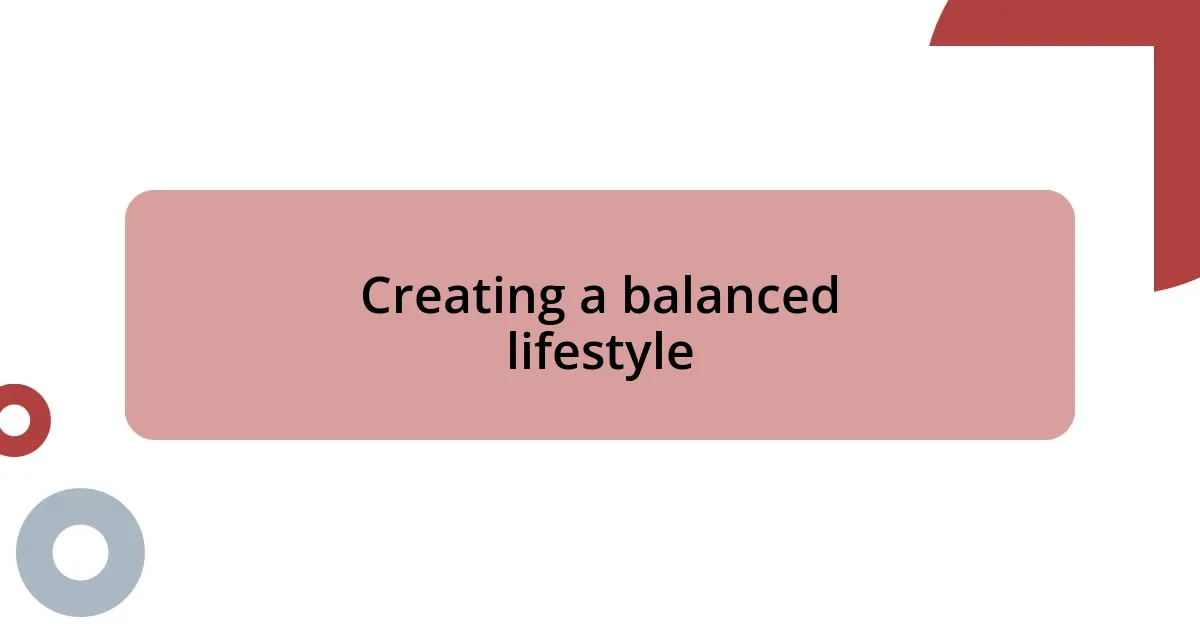
Creating a balanced lifestyle
Creating a balanced lifestyle begins with recognizing where my time and energy go. I remember a period when I poured every waking moment into my relationships, often neglecting my own desires and interests. One day, I stumbled upon an old sketchbook that I hadn’t touched in years. That moment ignited a spark—I realized I missed creating art. Allowing myself to explore hobbies I love became essential in restoring my balance, reminding me that it’s okay to invest in myself.
In my journey, I also discovered the power of planning my days intentionally. I was often caught off-guard by obligations that drained me, leading to evenings spent feeling emotionally depleted. Now, I dedicate time each week to map out not just my commitments, but also moments for solitude and self-reflection. Allocating time for activities that nurture my soul has transformed the way I approach daily life. Have you ever thought about how a little planning might liberate you from feeling overwhelmed?
Another crucial aspect of maintaining balance is being open to flexibility. I recall a recent weekend where I planned to reorganize my living space, aiming for efficiency. However, a spontaneous invitation from a friend to go hiking came up. Instead of sticking rigidly to my plans, I embraced the opportunity and experienced a refreshing adventure instead. That day reminded me that balance doesn’t always mean sticking to a schedule; sometimes, it means recognizing when to let go and live in the moment. How adaptable are you when it comes to your self-care?












